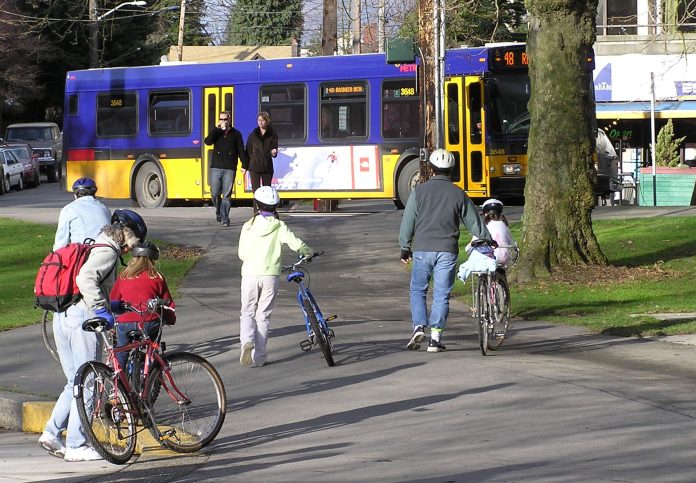Futurewise and Skyway Solutions Advocate for Equity in Skyway Subarea Plan
As the King County Council considers a draft of the Skyway-West Hill Land Use Subarea plan, Futurewise and Skyway Solutions are asking the council to consider a set of equity-focused improvements, with a particular focus on improving the inclusionary zoning requirements.
Skyway-West Hill is an unincorporated area of King County located just to the south of Rainier Beach. This subarea plan update is the first of a series and is the first update since the council restructured the Subarea Planning Program in May of 2018, focusing the plan on land use policies. (For more context on the planning process, check out this article from 2017.)
On the whole, the draft subarea plan has a lot of potential to improve the Skyway-West Hill communities. That said, Futurewise and Skyway Solutions see a number of areas for improvement.
Improving Inclusionary Zoning Requirements for Affordable Housing
The subarea plan would increase the allowable density of new developments in three of the neighborhoods’ transit-served nodes; we strongly support this change. The proposed zoning change also includes an inclusionary zoning (IZ) development restriction that would require new large-scale multifamily buildings to reserve 10% of their units for households earning no more than 70% of the King County area median income. While we support the intent of this policy (i.e., to encourage new private development to be more equitable by serving some lower-income residents), we are very concerned by the proposed policy and do not support it in its draft form.
We are concerned that the County is proposing to substantially increase the allowable development capacity in part of Skyway-West Hill before the Equitable Housing Development Program (EDHP) has been implemented. While we are supportive of the encouragement of more homes being built (especially income-restricted ones), it is important to us that the implementation of these growth-enabling policies coincide with the creation of anti-displacement policies. Failing to do so could easily exacerbate the displacement pressure that many residents mentioned throughout the engagement process.
The Equitable Housing Development Program (EHDP) is a separate initiative with its own timeline and its policies will apply not only to Skyway-West Hill but also to many other communities throughout the county.
Rather than tabling the Skyway-West Hill upzones until the EDHP is released in 2021 or proceeding ahead with them as proposed, Futurewise and Skyway Solutions advocate for an approach that we believe to be a compromise between those two alternatives. We suggest that the IZ requirements be increased to twenty-five percent (25%) of newly constructed dwelling units will be reserved for households at fifty percent (50%) of King County area median income (AMI).
Increasing the affordability requirements will reduce redevelopment pressure on the upzoned areas and help increase the likelihood that the developers who do decide to invest in the community are not solely driven by the desire to capitalize on the windfall opportunity created by zoning changes. But more importantly, increasing the requirements will allow new development to better serve the renter community.
The majority of renters—approximately 55%—have incomes less than 50% of the area median income and would not be able to pay a 70% AMI rent without becoming severely housing-cost burdened. An additional 14% of renters earn between 50% to 80% AMI, which—depending on exactly how much a household earns—could also be insufficient to afford these new units.
While we recognize that private development projects need to be profitable and, therefore, are not well suited for serving low- and very low-income residents, we believe that they should be required to serve a broader income spectrum than the plan currently calls for. Working class renters earning between 50% to 70% of the AMI also deserve to continue living in this community and the new equitable development.
Additionally, the performance of this inclusionary zoning policy should be systematically monitored by the County’s Department of Local Services. If a wave of new projects are proposed following the zoning changes, then the affordability thresholds and set-aside percentages should be recalibrated to produce more affordable units. On the other hand, if very few projects are proposed, then the restrictions should also be reassessed after the implementation of the Equitable Housing Development Program in 2021.
Additional Equity Focused-Improvements to the Subarea Plan
In addition to strengthening the inclusionary zoning requirements, Futurewise and Skyway Solutions are advocating for the King County Council to consider a full set of equitable policies to improve the overall subarea plan.
These policies include:
- Community Preference Policy: This policy would be one part of the right-to-return program and would apply to all affordable housing units in the subarea, including any new units created by private developments participating in the new inclusionary zoning requirements.
- Redevelopment Assistance Program: A redevelopment assistance program would help eliminate barriers that prevent residential property owners from redeveloping their property themselves, including updating regulations for missing middle housing types, reducing development costs, and supporting immigrant households and/or households of color in gaining access to financing tools.
- Investing in Community-Led Real Estate Development: The County can support the development of community-led real estate projects by providing guidance on how to efficiently navigate permitting processes, eliminating regulatory barriers to co-ownership models, brokering partnerships with funding sources, and investing public funds in the community.
- Improving the Equity Impact Assessment: The existing equity impact assessment fails to distinguish how the potential impacts may differ between the populations of concern. The absence of a disaggregated, quantitative impact analysis makes it difficult to for equity-minded partners to decide whether they can support the plan or not. We suggest that the County consider commissioning such an analysis as a follow-up to this plan and that any policy which disproportionately negatively impacts a population of concern (in relation to taking no action) be either fixed or abandoned.
The draft subarea plan includes many good ideas that if implemented well and funded appropriately, could result in positive on-the-ground changes in the Skyway-West Hill communities. Incorporating these suggested equity-focused improvements would further improve quality of life for Skyway-West Hill residents.
Court of Appeals largely upholds Futurewise wins protecting working farms and forests in Clark County
On March 23, 2017, the Growth Management Hearings Board (Board) ruled for Futurewise and the Friends of Clark County concluding that Clark County’s 2016 comprehensive plan update violated the Growth Management Act (GMA). While the County has brought some parts of the comprehensive plan into compliance, Futurewise has won three other Board orders concluding that parts of the 2016 update continue to violate the GMA. The County, developers, two cities, and a conservative organization appealed these decisions to court.
On August 20, 2019, the Court of Appeals, Washington State’s intermediate court that hears appeals of lower court and agency decisions, largely upheld the Board’s conclusions in the first two appeals. This largely vindicated previous wins. The court’s decision upheld the Board’s conclusions that de-designating 602 acres of working farmland for an unneeded industrial land bank violated the GMA. The County’s own studies showed the land was unneeded to meet the County’s 20-year employment targets and qualified as agricultural land.
The court also agreed that the Board was correct to conclude that Clark County’s weakening of protections for farm and forest land violated the GMA. The court concluded that substantial evidence showed that the weakened regulations would not conserve farm and forest land. This conclusion strengthened protections for 34,535 acres of agricultural land and 4,842 acres of forest land. This is over 61 square miles of farm and forest land.
Unfortunately, Futurewise did not win on all issues. The court agreed that the annexations made the appeal of the La Center and Ridgefield urban growth area expansions moot. Since the County no longer has land use planning authority over the annexed land, the Board cannot compel the County to correct the GMA violations.
The court also concluded that the Board was correct in concluding that when Clark County repealed some of the comprehensive plan and development regulations amendments that the Board had found to violate the GMA and then readopted its earlier policies and regulations that these changes cured the GMA violations. Futurewise has asked the Court of Appeals to reconsider this conclusion because the County did not readopt its earlier policies and development regulations. The County left in place rezones that doubled the densities on 291 rural lots that the court did not address.
The Board had also concluded that the La Center, Ridgefield, and Clark County had not adopted changes to their development regulations to provide for higher residential densities that were consistent with the County’s policies. While the court of appeal’s decision that the annexations mooted the appeals related to annexed land probably applies to La Center and Ridgefield, it is unclear whether the County must adopt regulations to increase urban densities. Futurewise will continue to work on policies that encourage more affordable housing and pave over less land and seek to show that the County is still obligated to adopted higher urban densities.
Clark County has decided not to appeal these victories. A conservative organization has asked the Washington State Supreme Court to review the court of appeals decision. The Supreme Court can choose whether to hearing this appeal or not. The state supreme court’s review will take three to six months. Futurewise will continue to defend our wins and Clark County’s working farms, working forests, rural lands, and to encourage growth in existing cities and towns.
The Urbanist is in the midst of its fall subscriber drive. Please consider becoming a monthly supporter.
Futurewise works throughout Washington State to encourage healthy, equitable, and opportunity-rich communities and to protect our most valuable farmlands, forests and water resources through wise land use policies and practices. Founded to help support implementation of the first-in-the-nation Growth Management Act, we focus on directing equitable growth into our urbanized areas and preventing the conversion of wildlife habitat, open space, farmland, and working forests to subdivisions and development.



